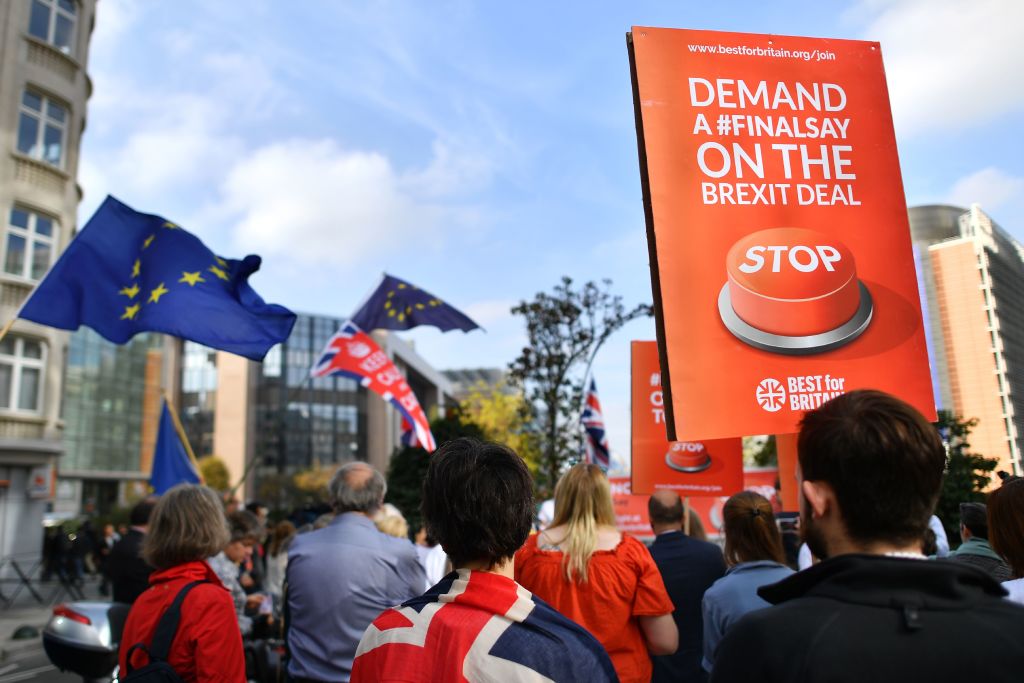The campaign for a second referendum continues to grow. On the Conservative side, nearly a dozen Tory MPs now support a ‘People’s Vote’ and if Theresa May’s deal gets voted down, this number is likely to rise further. Among Labour MPs, support is even greater; if it wasn’t for Jeremy Corbyn and John McDonnell, it seems safe to say that a second vote would almost certainly be Labour party policy by now, with the SNP and the Lib Dems also on board with the idea. But a question remains: have those calling for a second vote really thought about the possible consequences?
It is clear that many of those campaigning for another referendum have a simple objective: to block Brexit. But this could easily end up backfiring. Take the 2014 Scottish independence referendum. Its principle legacy was arguably to create a solid lump of convinced independence voters throughout Scotland. The nationalists might have lost but, a year later in the 2015 general election, the SNP performed well: Nicola Sturgeon’s party managed to achieve 50 per cent of the popular vote and 56 of 59 parliamentary seats. It’s true that this was somewhat reversed in the snap general election two years later, but the SNP still retained 35 of those seats with only 36.9 per cent of the popular vote.
If Britain did vote to ‘Remain’ in a re-run of the referendum, the feeling of betrayal among those who voted for, and expected, Brexit in 2016 would be compounded. With such a grievance, these voters might well take out their annoyance at the next general election, punishing those who they felt had blocked Brexit before it ever happened. It’s true that the 2016 referendum was split by a relatively narrow 52/48 per cent margin. But given that 221 seats across the UK have majorities of less than 10 per cent of the total electorate, fed-up Leavers could easily become a formidable voting bloc, especially when you take into consideration that 421 out of 574 English and Welsh constituencies backed Brexit the first time around. If the SNP can dominate Scottish politics with around a third of the vote, the ‘People’s Vote’ campaign should consider what impact a disgruntled and motivated Leave vote could have at the next general election.
So which party would benefit from this changed electoral landscape? It’s likely that the Labour Party would find it difficult to do so. Roughly 70 per cent of Labour-represented constituencies voted Leave and if the party supported a second referendum there would be fierce cries of betrayal. The Ukip of today is a shadow of its former self and with Gerard Batten’s decision to cosy up to Tommy Robinson it is difficult to see how such a spent force could really capitalise. The Lib Dems, meanwhile, would maintain their quiet irrelevance. And although the SNP would probably keep much of their support north of the border, their stance would certainly cost them votes among fishing communities.
So what about the Tories? Assuming that only a handful of rebels defied the government to back a second vote, the Tories could plausibly claim that the referendum was against their wishes. In such circumstances, the party could hold itself together and capitalise at the next general election. With Theresa May gone, rank-and-file Tory party members are more likely than not to opt to replace her with a ‘true Brexiteer’, particularly if they felt their original vote in the referendum had been thwarted. If the party then chose to stand on an explicit platform of leaving the EU, it could end up winning a thumping majority thanks to that hard-core Leave vote.
So far, so bad for many of the left-wing proponents of a second referendum. However, it’s potentially still worse for them. A Conservative party leader elected in this manner could be further to the right on a whole range of issues than any since Thatcher. For evidence of this, just look at the make-up of the ERG – very white, very male, quite old, more fiscally Conservative, but also much more socially Conservative. The soft-centrist-liberal consensus typified by Blair and Cameron would be shattered. In Scotland, the SNP’s argument that Scotland’s voice was being ignored would gain traction and the clamour for another Scottish independence vote might be irresistible. A national referendum result is one thing; being taken out of the EU unilaterally by English Conservative MPs is quite another. Furthermore, given Ruth Davidson’s previous comments, it seems likely that the Scottish Conservatives would find it hard to stay in tune with their English counterparts.
So while a second referendum might seem like a good idea to some, its supporters should be careful what they wish for. David Cameron has come in for much criticism for failing to think through the consequences of the first referendum; but are the ‘People’s Vote’ campaign guilty of doing the same?






Comments